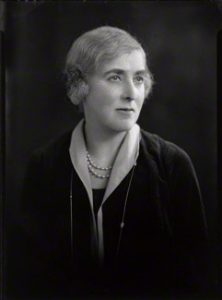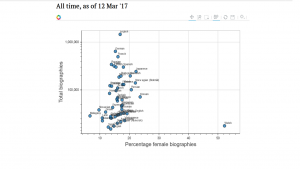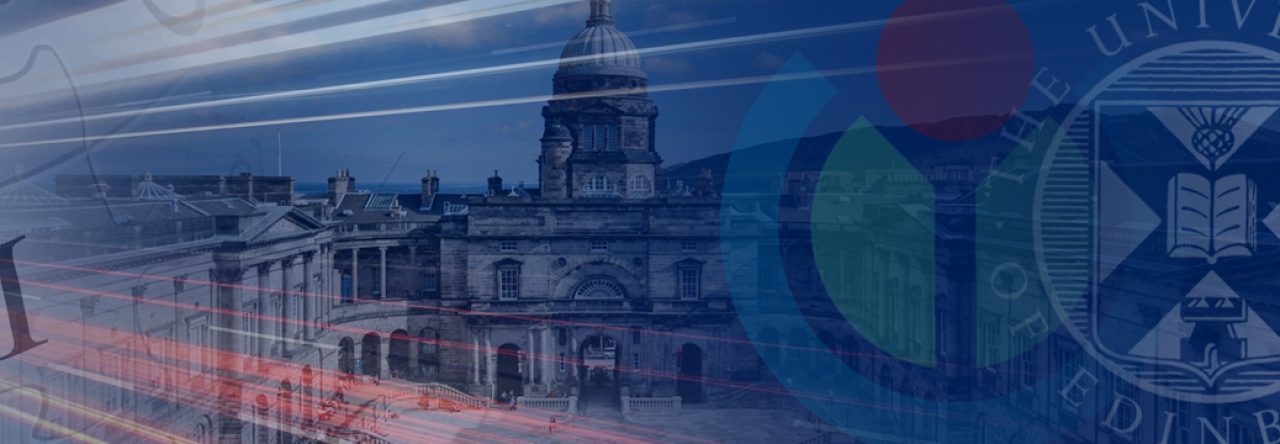
Suffragist and journalist Helen Alexander Archdale. Pic by Lafayette (Lafayette Ltd), half-plate film negative, 3 February 1928
As part of Gather Festival 2017 and to mark International Women’s Day, on Wednesday 8th March 2017, the University’s Information Services team ran a Wikipedia edit-a-thon at the School of Informatics. Full Wikipedia editing training was given to attendees before the afternoon’s editathon focused on creating new articles about the many inspiring women missing from Wikipedia.
In November 2014, just over 15% of the English Wikipedia’s biographies were about women. Founded in July 2015, WikiProject Women in Red has brought the figure up to 16.83%, as of 29 January 2017. But that means, according to WHGI, only 242,601 of our 1,441,879 biographies are about women. Not impressed? “Content gender gap” is a form of systemic bias, and Women in Red events take place across the globe in order to address it in a positive way.

Screengrab of latest WHGI stats.

Mary Susan McIntosh (1936–2013) sociologist, feminist, political activist and campaigner for lesbian and gay rights in the UK.
Outcomes – New pages created
- Helen Alexander Archdale – (1876–1949) was a feminist, activist, and journalist. Helen took part in a WSPU demonstration in Edinburgh on the 9th of October 1909. Later that month she was arrested with Adela Pankhurst and Maud Joachim in Dundee and convicted of a breach of the peace after interrupting a meeting being held by the local MP, Winston Churchill. Following this on 20th October all three women went on hunger strike. All three were released after four days of imprisonment. In December 1911 Helen received a sentence of two months’ imprisonment for window-breaking at Whitehall. Her daughter, Betty Archdale (1907-2000) remembered collecting stones for her mother to use, and visiting her in Holloway Prison. Helen was the secretary, and later international secretary, for the Six Point Group founded by Margaret Rhondda. The group’s specific aims were: (1) Satisfactory legislation on child assault; (2) Satisfactory legislation for the widowed mother; (3) Satisfactory legislation for the unmarried mother and her child; (4) Equal rights of guardianship for married parents; (5) Equal pay for teachers; (6) Equal opportunities for men and women in the civil service. In 1926 Helen and Margaret founded the Open Door Council with Chrystal Macmillan and Elizabeth Abbott in order to focus on economic emancipation. In 1927 Helen became active in international feminist activism, and began working in Geneva lobbying for an Equal Rights Treaty at the League of Nations in the early 1930s. She became secretary of the Liaison Committee of Women’s International Organisations, a coalition to promote equal rights, disarmament and women’s representation at the League. From 1929 to 1934 she chaired Equal Rights International, founded at The Hague ,an organisation dedicated to promoting campaigning for equality of women with men in law and in the workplace. Helen was also active in Open Door International, also founded in 1929, and a leading advocate of the equalitarian feminism.
- Agnes Syme Macdonald (1882 – 1996) was a Scottish suffragette who served as the secretary of the Edinburgh branch of the WSPU before setting up the Edinburgh Women Citizens Association (WCA) in 1918[1]. She was WCA’s fist and longest-serving secretary. She campaigned on various social issues and was active in the Quaker relief work for European refugees (Society of Friends); the Barns School for delinquent city boys and the Edinburgh Old People’s Welfare Council.
- Catherine Isabella Barmby – (1816/17 – 26 December 1853) was an utopian socialist and writer on women’s emancipation. She was the daughter of Bridstock Watkins and belonged to the lower-middle class. Little is known of her early life or education, however, her instruction allowed her to become a writer and lecturer. She wrote several articles for the Owenite socialist newspaper New Moral World on feminist demands and her Millennialist beliefs.
- Ketaki Kushari Dyson – (nee Ketaki Kushari) is a Bengali-born poet, novelist, playwright, translator and critic, diaspora writer and scholar. Born (26 June 1940) and educated in Calcutta (Kolkata), she has lived most of her adult life near Oxford, U.K. She writes in Bengali and English, on topics as wide-ranging as Bengal, England, the various Diaspora, feminism and women’s issues, cultural assimilation, multiculturalism, gastronomy, social and political topics.
- Mary Susan McIntosh (1936–2013) sociologist, feminist, political activist and campaigner for lesbian and gay rights in the UK. In 1960 Mary was deported from the USA for speaking out against the House Un-American Activities Committee. On her return to the UK Mary worked as a researcher for the Home Office from 1961 to 1963 before taking up the post of lecturer in Sociology at the University of Leicester from 1963 to 1968. Mary joined the University of Essex in 1975 as a lecturer in the Department of Sociology, she later became the first female head of the department and remained at the University until she retired in 1996. Throughout her career Mary taught a wide range of courses covering criminology, theory, sociology, social policy, the family, gender studies, feminism and Marxism.
- Mira Hamermesh (15 July 1923 – 19 February 2012) was an independent Polish filmmaker and artist who made documentaries for British television. She was a student of painting at the Bezalel Art School in Jerusalem and later moved to London to study at the Slade School of Art. Mira returned to Poland in 1960 to study at the polish film school where she began documenting her personal experience of fleeing Nazi occupied Germany as a Jewish teenager.
- Mary Elizabeth Phillips (suffragette) (15 July 1880 – 21 June 1969) was a suffragette, feminist and socialist. Mary was the longest serving suffragette prisoner.
- Mona Wilson (author) (29 May 1872 – 26 October 1954) was a British civil servant and author. After being appointed to the National Insurance Commission in 1911, she received a yearly salary of £1000, making her the highest-paid woman civil servant of the time and one of the first women to receive equal pay. She wrote several scholarly works after her retirement from the civil service in 1919, including The Life of William Blake (1927), which went through several reprintings and remained popular for several decades.
- Maggie Keswick Jencks (10 October 1941- 8 July 1995[1]) was a writer, artist, garden designer and co-founder of Maggie’s Centres.
- Kathleen Molyneux Mander (29th September 1915 − 2013) was a documentary film-maker. During the 1930s she joined the Communist Party and attended Left Book Club meetings. Her political leanings would later influence her filmmaking. In 1937 she was the first woman to join the film industry’s union, the Association of Cinematographic Technicians (ACT) (now BECTU). She had a column in the ACT journal, The Cine-Technician, until the 1950s, where she wrote union issues such as the need for equal pay and post-war job security. After the end of WW2 her membership of the Communist party made it more difficult for her to find work.
- Emilia Vosnesenskaya – Vosnesenskaya taught Russian at the Joint Services School for Linguists. She became a naturalised British citizen on January 1st 1957 at which point she was an Assistant University Lecturer. She moved to the University of Edinburgh in 1956 and taught there until her retirement. She contributed to the BBC series Keep Up Your Russian, and associated grammar booklet, in 1960.
- Kay Carmichael (née Rankin) born Shettleston, Glasgow on 22 November 1925. She was an influential character in Scottish politics and activist against nuclear submarines in Scotland. Studying at Edinburgh University she went on to hold the post of Senior Lecturer at Glasgow University. At the age of 20 she joined the Independent Labour Party in Scotland. Her activism included ‘guerrilla raids’ into Faslane Naval Base to plants flowers for which she was sentenced to two weeks in prison.
- Şükûfe Nihal Başar – (1896 – 24 September 1973) was a Turkish educator, poet and activist who took part in the earliest women’s liberation movements during Turkey’s nation building process. Having graduated from the Geography department of the Literature Faculty of İstanbul Darülfünün in 1919, she holds the title of “the first woman graduate of Darülfünun”. Whilst she worked as a literature tutor for many years in Istanbul High School for girls, she took active role in various women’s associations and wrote columns in journals and newspapers about women’s rights. In her short stories and novels, she highligts the female female characters, trying to be the voice for “the new woman” of the early republican era.
- Elizabeth Burns (poet) – (1957-2015) was a poet and creative writing teacher. She was born on 17 December 1957, in Wisbech, Isle of Ely, Cambridgeshire. Her mother Muriel (Hayward) was from Bristol and her father, David Grieve Burns from Kirkcaldy.
- Lucrezia Buti (Florence, 1435 – sixteenth century) was an Italian nun, and later the lover of the painter Fra Filippo Lippi. She is believed to be the model for several of Lippi’s madonnas.

Women in Red – articles that are red-linked on Wikipedia are ones awaiting creation. Only 16.85% of biographies on Wikipedia are about notable women.

We Can Edit
